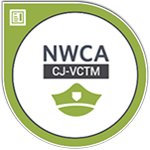PURPOSE
The Victimology credential documents the essential knowledge and skills required for law enforcement, court, and other criminal justice, crime prevention, and victim services professionals who work with victims of crimes.
AUDIENCE
This credential is appropriate for any professional who works in the criminal justice, crime prevention, and victim services areas including police officer, probation officers, parole officers, victim services workers, officers of the court, law professionals, adult and juvenile case managers, mental health professionals, and criminal investigators.
JOB/CAREER REQUIREMENTS
This credential documents the acquisition of knowledge related to victims and the offender-victim relationships whether the violence occurs in the home, in the community, or as a result of personal assault, abuse, or neglect. Any professional working in the criminal justice arena or in victim services, including juvenile justice and social services must understand the different types of violence and the relationships between the victim and the offender. They must understand the relevant data and situations in which victimization occurs as well as the interactions between victims and the criminal justice system. Finally, they must understand the social influences and environments of victims of various crimes. Knowledge of victimology allows for the establishment and implementation of best practices that lead to the effective services for victims and crime prevention. These professionals may work directly with victims, or work indirectly by researching or investigating crimes that create.
VICTIMOLOGY WORKPLACE TASKS:
- Social workers provide victim services, resources, and crisis aid to victims of crime including victims of domestic violence, sexual assault, and child abuse.
- Psychologists and therapists assist victims in dealing with the psychological and emotional impact of being the victims of a crime and in regaining a sense of security and power after a crime or changing behaviors and patterns that resulted in being a victim.
- Professionals in the criminal justice arena investigate crimes and profile both offenders and victims to assist in solving crimes and in crime prevention.
- Researchers and statisticians analyze crime and victim data to assist in profiling offenders and victims and in providing data to help in crime investigation and prevention.
- Law enforcement officers and investigators use victimology to know how to best handle specific situations involving victims and in crime investigation and prevention.
- Law professionals must understand victimization concepts to defend both victims of crimes and those individuals who have been accused of a crime.
- Professionals in child protective services use victimology to provide the needed services and advocacy for children who are victims of crime.
- Victim advocates use victimology to provide the needed services and support to victims of crimes and witnesses as well as supporting victims through hotlines, domestic violence shelters, and safe houses.
- Criminal profilers use knowledge of victimization to develop profiles of both criminals and victims to assist in solving crimes and crime prevention.
- Sociologists use knowledge of victimization in understanding how crime impacts society.
- Crime analysts use knowledge of victimization and victims to help law enforcement professionals to predict patterns of behavior in an attempt to prevent certain types of crimes and enhance public safety as well as in solving specific crimes.
EXAM STRUCTURE OVERVIEW
Number of Questions in Exam: 90
Total Time: 90 minutes
Overall Passing Score: 70%
(All sections require an individual passing score of 70%)

